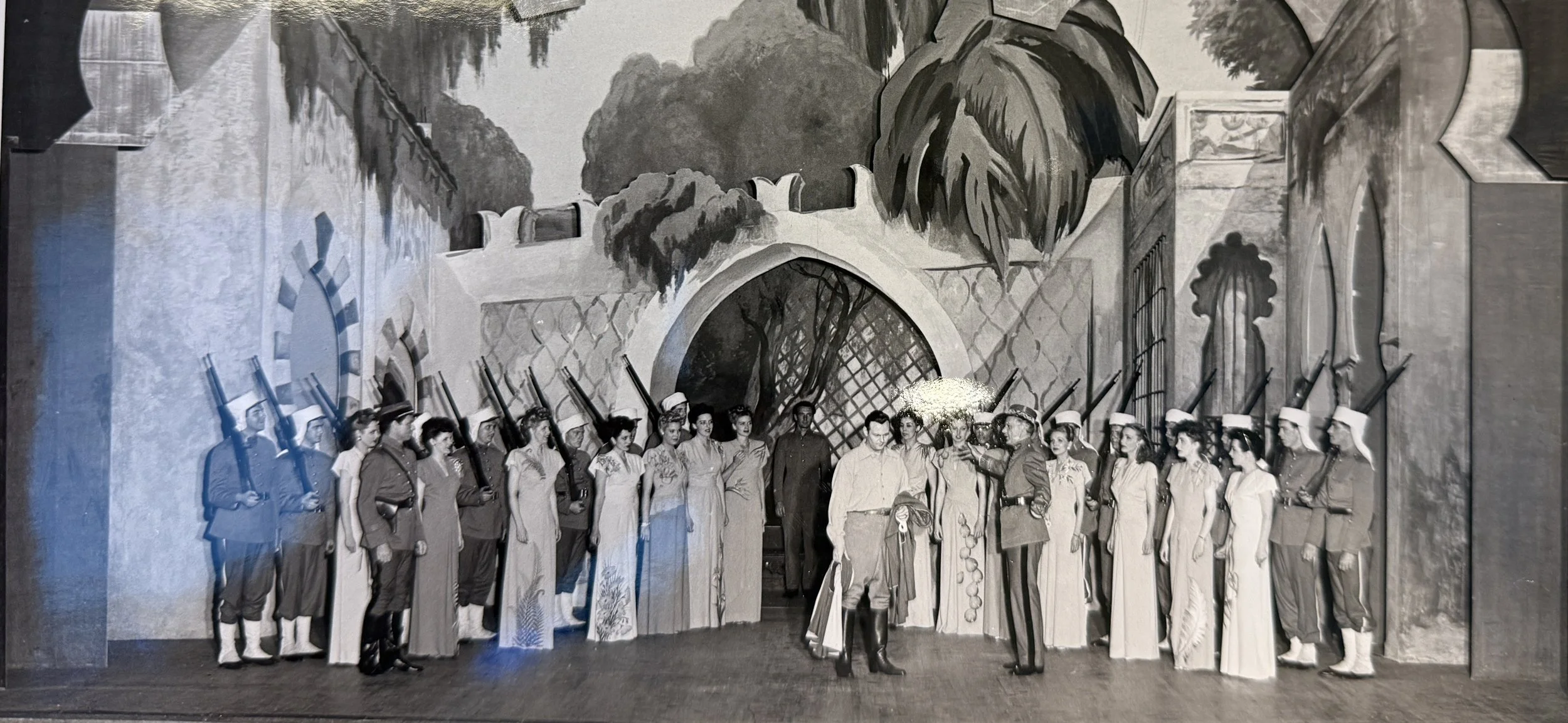American Musical Productions
THE DESERT SONG
Auditions
All Auditions will be done virtually. Please prepare and film two contrasting pieces from light opera or classic musical theatre repertoire. They must be in English.
How to submit your virtual Audition
(Submission deadline february 27, 2026)
Please record your audition pieces.
Upload your recorded audition to YouTube or Vimeo. Include both songs in one YouTube
(or other video or file hosting site) file.Please start the Audition Application Form by clicking the button above.
At the end of the form, you can enter the link to your audition.
Upload your musical resume.
Press “Submit” to complete the application.
PERFORMANCES:
Friday, July 10, 2026 7:30 PM - Hoover Auditorium, Lakeside Chautauqua, Ohio
Sunday, July 12, 2026: 3:00 PM - Firestone Theatre, Akron, Ohio (Free Admission)
The Desert Song will be a fully staged production with an 24-piece orchestra.
Rehearsals will be weekday evenings 7-10 PM and weekend afternoons from June 22-July 8 in Akron, Ohio. (no rehearsals July 3-5).
Not everyone will be required for every rehearsal. Tech/Dress Rehearsals July 7 & 8, 2026.
Music must be learned prior to the first rehearsal, learning tracks and recordings will be provided.
All performers should be 18+ and are paid a stipend.
Email Director Joseph Rubin with any questions: jrubin@americanmusicalproductions.org
Production Staff for The Desert Song
Producer & Musical Director: Joseph Rubin
Stage Director: Jay Spencer
Choreographer: Jennifer Justice
Chorus Master: Adam Fehrenbach
Casting, Wigs & Makeup: Jackie Luthy
Head of Wardrobe: Laurie Gartman
The Desert Song Cast Breakdown
Music by Sigmund Romberg Book & Lyrics by Otto Harbach, Oscar Hammerstein II & Frank Mandel
PRINCIPAL CAST
Margot Bonvalet: beautiful, strong willed young woman- lyric soprano-high C
Susan, an incompetent newspaper reporter's lovesick secretary, Bennies sidekick, must have strong comedic skills - mezzo soprano
Clementina, Spanish courtesan - Mezzo-Soprano
Pierre Birabeau, young leading man, has two personas as "The Red Shadow" he is suave, romantic, and aggressive, as Pierre Birabeau he is shy and timid - high baritone-A flat
Sid El Kar, The Red Shadow's lieutenant - tenor-high C
Captain Paul Fontaine, Captain of the French Foreign Legion, the military is his life, engaged to marry Margot Bonvalet - baritone-G
Benny, American newspaper reporter, comedian
Ali Ben Ali, Caid of a Riff tribe - Bass-Baritone, low F
Hassi, of the Red Shadow’s Band
Mindar, of the Red Shadow’s Band
NON-SINGING Roles
Azuri, featured dancer, native woman in love with Paul Fontaine, must be very strong dancer with strong acting skills
General Birabeau, father of Pierre Birabeau and general in the French Foreign Legion
Ensemble Roles
Neri, a Riff woman
Edith, Susan's friend
Lieutenant La Vergne and Sergeant De Boussac, Foreign Legionnaires
Ensemble: Tenors, Basses, Sopranos, Altos
Plot AND HISTORY
This 1926 operetta from the team who had created Rose-Marie was inspired by the 1925 uprising of the Riffs, a group of Moroccan fighters, against French colonial rule. A swashbuckling romance/adventure story, The Desert Song presents a brave and dynamic hero who takes on a mid-mannered persona to conceal his true identity – a theme explored in pop culture tales ranging from The Scarlet Pimpernel and Zorro to Superman.
The musical opened on Broadway at the Casino Theatre on November 30, 1926 and was an instant hit. Walter Winchell called it “One of the treats of the town… A tuneful, gay and lavishly upholstered entertainment.” The production ran an impressive 471 performances, closing on January 7, 1928. The Desert Song returned to Broadway twice and was adapted into three major motion pictures. American Musical Productions celebrates the 100th anniversary of the show’s Broadway premiere.
The Desert Song was last seen on Lakeside Chautauqua’s Hoover auditorium stage 65 years ago on August 12, 1961 Akron first saw The Desert Song on the stage of the now demolished Colonial Theatre on October 15-16, 1928. The Akron Beacon Journal raved “the piece boasts music by the infallible Sigmund Romberg of Student Prince and Blossom Time fame…the score is the outstanding feature of this musical comedy.” This was followed by a local production, the inaugural show of the Goodyear Operetta Society at the Goodyear Theater December 7-9, 1944. The 1945 Broadway revival again played the Colonial on November 8, 1945. The Goodyear Operetta Society repeated The Desert Song as their 15th production December 7-9, 1951.
Synopsis
Unknown to anyone, Pierre Birabeau, son of the French governor of a Moroccan province, is also the “Red Shadow,” leader of the native Riff tribes. When Margot Bonvalet arrives from Paris, Pierre, in disguise, makes love to her and abducts her to the retreat of Ali Ben Ali. After the French forces are captured by the Riffs, Pierre refuses to fight a duel with his father and is banished by his men for this seemingly cowardly behavior. Carrying the clothes and mask of the “Red Shadow,” he returns to French headquarters, where he is hailed as a hero for having killed the outlaw.


